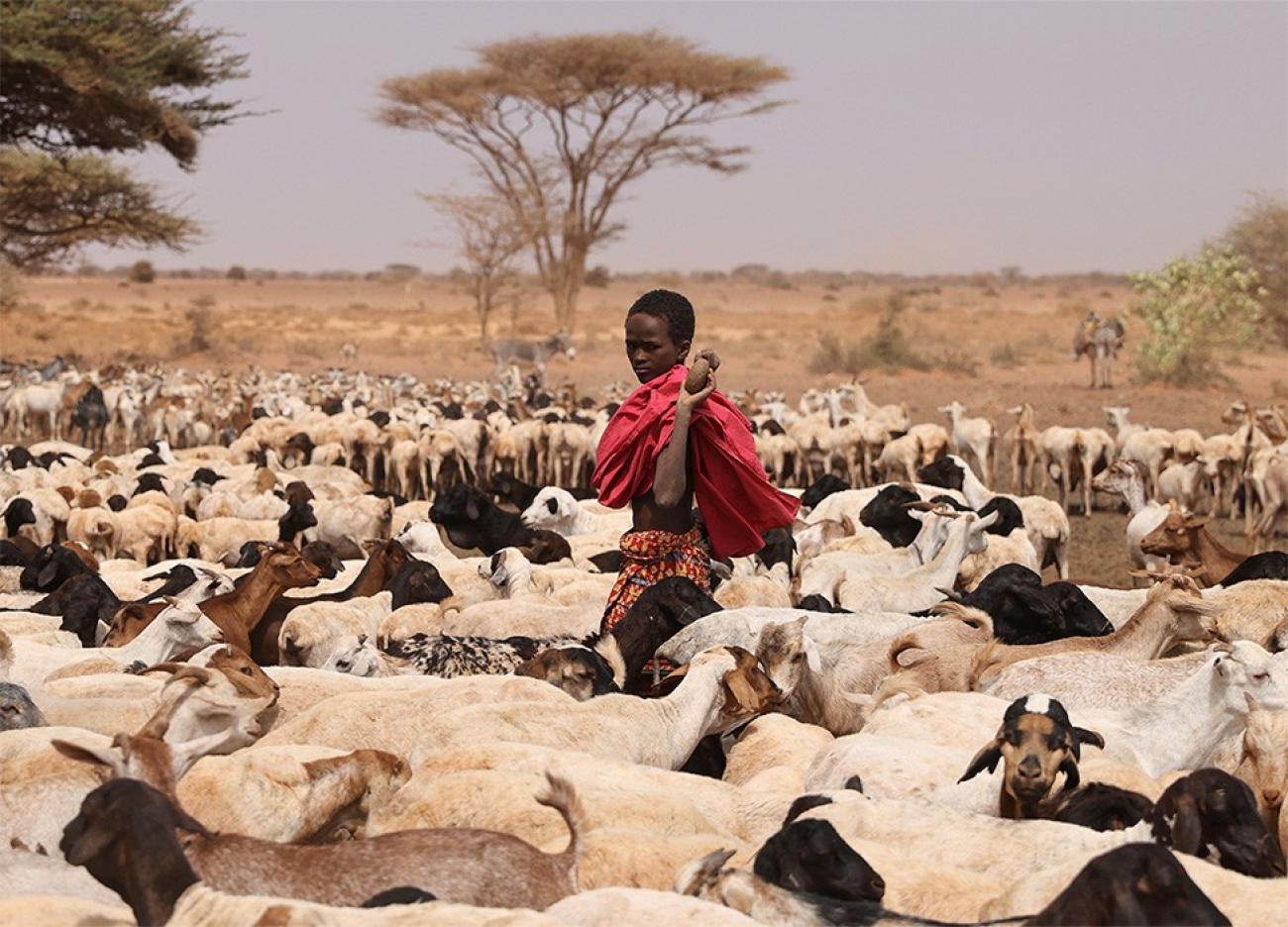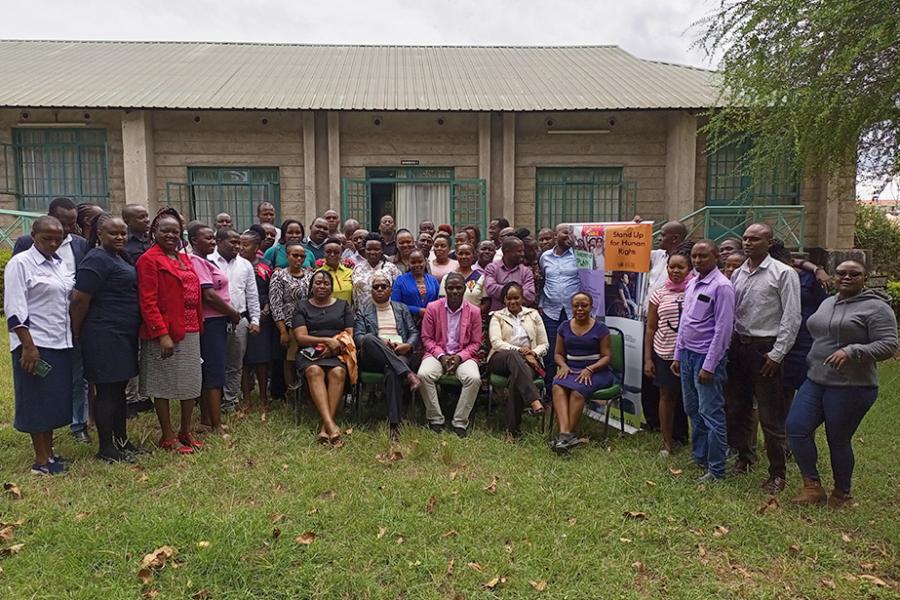Supporting a human rights economy in Kenya

Kenya's UN-backed initiative is championing a human rights economy, engaging citizens into the County-level budget-making process and ensuring accountability.
When it comes to improving the lives of its citizens, allocating budgets to programs that meet their priorities and giving people a role in how their local government spends public resources is at the root of making the Sustainable Development Goals (SDGs) a reality.
“If communities know how the budget is being allocated, they can hold their governments accountable,” said Vincent Omunyin, a UN Human Rights Officer in Kenya.
A new initiative that is being piloted in Kenya by UN Human Rights is doing just that, by training communities about human rights-based budgeting and equipping them with tools to engage in county-level budgeting processes that determine allocations for basic social services.
“Citizens, especially the most vulnerable and marginalized, need to know about the budget process to hold the government accountable for realizing their rights through resource allocation,” said Li Fung, Senior Human Rights Adviser to the UN Resident Coordinator in Kenya. “It’s also about strengthening grassroots engagement in claiming their rights and supporting governments to be able to deliver on them.”
Public participation is one of the national values and principles of governance upheld in the Constitution of Kenya. Fung and her team, in collaboration with the UN Resident Coordinator’s Office and with the support of the UN Human Rights Surge Initiative macroeconomist, are creating ways to strengthen public participation in governance processes, including the budget cycle, to ensure that the marginalized groups are seen and heard in the budget-making process at the county level.
“By empowering people to know what their economic, social and cultural rights are and accompanying their participation in the budget process can facilitate change in the provision of government services and, therefore, their lives,” said Todd Howland, UN Human Rights Chief of Branch, Development, Economic, Social Rights. “It demonstrates how the exercise and realization of rights are truly interdependent.”
The counties of Marsabit and Makueni counties were selected as diverse pilot areas — with high levels of marginalization in drought-affected Marsabit, and a well-developed public participation framework in Makueni county. Inclusive engagement in governance processes will promote social justice, equality, and human dignity for all citizens, essential for the attainment of the SDGs, according to Fung.
These human rights ideals are guaranteed by the 2010 Constitution of Kenya, a landmark social contract setting out a blueprint for participatory governance, inclusive development and a society grounded on human rights and the rule of law. The Constitution also created a devolved system of government with 47 county governments in charge of the delivery of key public services, including the funding for health care, pre-primary education, and the maintenance of local roads. The effective allocation of these resources to meet local priorities requires government officials to hold consultations with its citizens, according to Fung.
"If County Governments are to use their budgets to effectively realise people’s rights, they need to understand the relationship of the budget to the human rights guarantees in the Constitution of Kenya."
Li Fung, Senior Human Rights Adviser to the Un Resident Coordinator In Kenya
Eunice Lepariyo, a UN Human Rights Senior Indigenous Fellow in Kenya, visited the counties of Baringo and Nakuru to engage with indigenous organisations and representatives on priorities to be addressed within county development planning and budget processes, and facilitate dialogue with county parliamentarians.
The initiative was an important opportunity for indigenous representatives to jointly analyse and participate in governance processes and interact with county parliamentarians and officials about their county’s integrated development plan and budget strategy.
“It was great to connect county parliamentarians with indigenous representatives because they know the issues personally and these are important priorities that need to be addressed at the county level,” she said.
Stepping up engagement
To ensure human rights is at the core of sustainable development, in 2019, UN Human Rights created the Surge Initiative in response to rising inequalities, the slow implementation of the SDGs and increasing social unrest. The mission of the Initiative is to step up engagement at the country and regional levels on economic, social, and cultural rights and strengthen the link between human rights and economics.
The Surge Initiative works with the Office’s 90 field presences, UN Country Teams, States, civil society, international financial institutions, and other key stakeholders. Through its multidisciplinary team, the Surge Initiative works on a variety of levels and in diverse ways. One of the Initiative’s key areas of engagement at the country level is the Surge Initiative’s seeding-change country projects, which is organized by UN Human Rights’ in-country and regional presences, with the technical and financial support of the Surge Initiative.
“For too long human rights advocates have not seen the importance of budgets to the realization of human rights,” said Howland. “With the Surge Initiative’s support, this is changing at UN Human Rights and a good example is the work in Kenya.”

The UN Human Rights team in Kenya received technical support from the Surge Initiative regional macroeconomist Martin Mulwa for this pilot initiative in Marsabit and Makueni to work on stepping up public participation in budget-making processes at the county level.
The team consulted with county government executives, members of county parliamentarians, communities, as well as civil society organisations who have already engaged in human rights and governance issues in these counties. Participants were provided an overview about the relationship of human rights to budget processes and specific steps in the budget-making process, so they could understand the role they play and entry points.
The county visits and engagement also gave UN Human Rights a deeper understanding of interest in and opportunities for building the capacity of county government officials in human rights-based budgeting.
The team is also identifying grassroots human rights budget champions who can be trained and equipped to lead participatory human rights-based budget engagement and expenditure tracking at the community level. Fung sees this as an accountability tool, in support of public participation and inclusive governance.
“I think it will be great to see budgets coming out of these counties that have allocations that reflect better the priorities of civil society and communities,” she said. “But to me it’s part of a longer-term engagement of supporting civic engagement and public participation in governance processes so that we are actually building the capacities of communities to engage with and hold government accountable.”
She expressed hope that building capacities for civic engagement will encourage governments to look at how communities can be involved in defining their own development, to be much more aware of their needs, and to inform how government responds to the priorities of marginalised groups, women and youth whose voices are not always heard.
“Bringing to the forefront voices of civil society and communities who are often left behind is a powerful motor for change, inclusive governance and sustainable development,” she said.
“This human rights economy will build greater social harmony,” said UN Human Rights Chief Volker Türk about the importance of building economies that are grounded in human rights. “For example, when people are able to follow the money through transparent and accountable budget decision-making, their scrutiny – and resulting dialogue – generate more effective policies and greater trust in government.”



